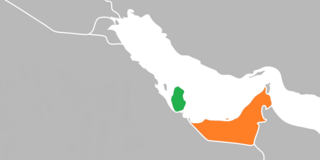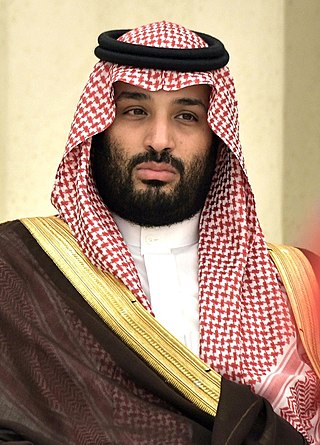Mohammad Yusuf Dahlan is a Palestinian politician. Arrested by Israel for being involved with the Fatah Hawks—the Fatah youth movement—he subsequently helped in negotiations for the Oslo Accords, later becoming a critic of Yasser Arafat. The former leader of Fatah in the Gaza Strip, Dahlan's power there as head of the Preventive Security Force was at one time so substantial that the territory was nicknamed "Dahlanistan". Seen as a favorite by the George W. Bush administration to be Mahmoud Abbas' second-in-command, Dahlan was appointed by the latter to head the Palestinian National Security Council. An antagonist of Hamas, he participated in the Fatah–Hamas Mecca Agreement before his power began to decline after the latter gained the upper hand in the Battle of Gaza. He was controversially elected to the Central Committee of Fatah amid allegations of fraud. Living in exile in Abu Dhabi, Dahlan has, according to Foreign Policy, had a hand in facilitating the Abraham Accords.

Jamal Ahmad Khashoggi was a Saudi journalist, dissident, author, columnist for Middle East Eye and The Washington Post, and a general manager and editor-in-chief of Al-Arab News Channel who was assassinated at the Saudi consulate in Istanbul on 2 October 2018 by agents of the Saudi government at the behest of Crown Prince Mohammed bin Salman.

Yousef Al Otaiba is the current United Arab Emirates ambassador to the United States and Minister of state. Previously Al Otaiba served as non-resident ambassador to Mexico. His father is Petroleum magnate Mana Al Otaiba, who served as the president of OPEC a record six times.

Saudi Arabia and Turkey relations have long fluctuated between cooperation and alliance to enmity and distrust. Since the 19th century, the two nations have always had a complicated relationship. While Turkey and Saudi Arabia are major economic partners, the two have a tense political relationship, stemming partially from the historic enmity.

Saudi Arabia and the United Arab Emirates (UAE) are neighbouring countries in the Middle East and Persian Gulf region, and share extensive political and cultural ties. Saudi Arabia maintains an embassy in Abu Dhabi and a consulate in Dubai of the UAE, while the UAE has an embassy in Riyadh and a consulate in Jeddah, Saudi Arabia.

Qatar and the United Arab Emirates share a naval border and are part of the Arabic-speaking Persian Gulf region. They are both members of the GCC.

The State of Israel and the Kingdom of Saudi Arabia have never had formal diplomatic relations. In 1947, Saudi Arabia voted against the United Nations Partition Plan for Palestine, and currently does not recognize Israeli sovereignty. However, as of 2023, bilateral negotiations towards Israeli–Saudi normalization are ongoing, with the United States serving as the two sides' mediator.

Mohammed bin Salman Al Saud, commonly known by his initials as MBS or MbS, is the de facto ruler of the Kingdom of Saudi Arabia, formally serving as Crown Prince and Prime Minister. He is the heir apparent to the Saudi throne and the seventh son of King Salman of Saudi Arabia and grandson of the nation's founder, King Abdulaziz.
Qatar has been accused of allowing terror financiers to operate within its borders, which has been one of the justifications for the Qatar diplomatic crisis that started in 2017 and ended in 2021. In 2014, David S. Cohen, then United States Under Secretary of the Treasury for Terrorism and Financial Intelligence, accused Qatari authorities of allowing financiers who were on international blacklists to live freely in the country: "There are U.S.- and UN-designated terrorist financiers in Qatar that have not been acted against under Qatari law." Accusations come from a wide variety of sources including intelligence reports, government officials, and journalists.

The New Arab or Al-Araby Al-Jadeed is a London-based pan-Arab news outlet owned by Qatari company Fadaat Media. It launched an Arabic-language website in March 2014 and an Arabic language daily newspaper in September 2014. The English version of its website is The New Arab.
Al Jazeera Arabic is a Qatari state-owned Arabic-language news television network. It is based in Doha and operated by the Al Jazeera Media Network, which also operates Al Jazeera English. It is the largest news network in the Middle East and North Africa region. It was founded in 1996 by the then Emir of Qatar Sheikh Hamad bin Khalifa Al Thani.

Iran and Saudi Arabia are engaged in an ongoing struggle for influence in the Middle East and other regions of the Muslim world. The two countries have provided varying degrees of support to opposing sides in nearby conflicts, including the civil wars in Syria and Yemen; and disputes in Bahrain, Lebanon, Qatar, and Iraq. The struggle also extends to disputes or broader competition in other countries globally including in West, North and East Africa, South, Central, Southeast Asia, the Balkans, and the Caucasus.
The Qatar diplomatic crisis was a high-profile incident involving the deterioration of ties between Qatar and the Arab League between 2017 and 2021. It began when Saudi Arabia, the United Arab Emirates, Bahrain, and Egypt simultaneously severed their bilateral relations with Qatar and subsequently banned Qatar-registered aircraft and Qatari ships from utilizing their sovereign territory by air, land, and sea; this involved the Saudis' closure of Qatar's only land crossing, initiating a de facto blockade of the country. Tensions between the two sides came to a close in January 2021, following a resolution between the Saudis and the Qataris.

Saudi Arabia–Qatar relations refers to the current and historical relationship between the Kingdom of Saudi Arabia and the State of Qatar. Prior to 2017, the two countries maintained cordial ties. Qatar was mainly subservient to Saudi Arabia in matters relating to foreign policy. Hamad bin Khalifa Al Thani's assumption of power saw Qatar reclaim its sovereignty in foreign affairs, often diverging from Saudi Arabia on many geopolitical issues. In 1996, the Qatari government launched Al Jazeera in a bid to consolidate soft power. One of the most watched news stations in the Arab world, Al Jazeera proved to be a wedge in the two's bilateral relations as it routinely criticized Saudi Arabia's ruler. The network also provided a platform for Islamist groups which are considered a threat to Saudi Arabia's monarchy.

The Qatar–Saudi Arabia diplomatic conflict refers to the ongoing struggle for regional influence between Qatar and the Kingdom of Saudi Arabia (KSA), both of which are members of the Gulf Cooperation Council (GCC). It is sometimes called the New Arab Cold War. Bilateral relations have been especially strained since the beginning of the Arab Spring, that left a power vacuum both states sought to fill, with Qatar being supportive of the revolutionary wave and Saudi Arabia opposing it. Both states are allies of the United States, and have avoided direct conflict with one another.

The 2017–19 Saudi Arabian purge was the mass arrest of a number of prominent Saudi Arabian princes, government ministers, and business people in Saudi Arabia on 4 November 2017. It took place weeks after the creation of an anti-corruption committee led by Crown Prince Mohammed bin Salman.
Salah Mohammed Abdah Al Tubaigy, also spelled Tubaiqi, is a Saudi forensic doctor. He was the head of the Saudi Scientific Council of Forensics and a colonel in the armed forces of Saudi Arabia.

On 2 October 2018, Jamal Khashoggi, a Saudi dissident journalist, was killed by agents of the Saudi government at the Saudi consulate in Istanbul, Turkey. Khashoggi was ambushed and strangled by a 15-member squad of Saudi operatives. His body was dismembered and disposed of in some way that was never publicly revealed. The consulate had been secretly bugged by the Turkish government and Khashoggi's final moments were captured in audio recordings, transcripts of which were subsequently made public.

Saud bin Abdullah al-Qahtani is a Saudi Arabian consultant and former royal court advisor. Prior to his dismissal in late 2018, he worked as an advisor to King Abdullah of Saudi Arabia and crown prince Mohammed bin Salman.
The assassination of Jamal Khashoggi, a Saudi dissident, journalist for The Washington Post and former general manager and editor-in-chief of Al-Arab News Channel, occurred on 2 October 2018 at the Saudi consulate in Istanbul and was denounced by the majority of the international community.













